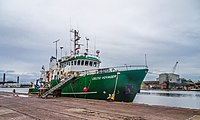
Marine Institute Ireland
This article has multiple issues. Please help or discuss these issues on the talk page. (Learn how and when to remove these messages)
|

| Foras na Mara | |
 | |
| Agency overview | |
|---|---|
| Formed | 1991 |
| Jurisdiction | Government of Ireland |
| Headquarters | Galway, Ireland 53°14′52″N 8°58′41″W / 53.24776°N 8.97814°W |
| Employees | 237 (as of 2021) [1] |
| Minister responsible | |
| Agency executives | |
| Parent department | Department of Agriculture, Food and the Marine |
| Website | www.marine.ie |
The Marine Institute (Irish: Foras na Mara) is a state agency in Ireland that provides government, public agencies and the maritime industry with scientific, advisory and economic development services, aiming to inform policy-making, regulation and the sustainable management and growth of the country's marine resources. Founded in 1991 on foot of a 1974 report, the institute undertakes and promotes marine research and development. The agency's staff and operations are governed by a ministerially-appointed board. Based at its headquarters near Galway, it has an office in Dublin and two research vessels.

History
Following the recommendation of the 1974 National Science Council report Ireland, Science and the Sea, the Marine Institute was established by the Irish government under the Marine Institute Act of 1991 "to undertake, to co-ordinate, to promote and to assist in marine research and development and to provide such services that, in the opinion of the Institute will promote economic development and create employment and protect the marine environment".[citation needed]


Starting with the appointment of its chief executive officer – Dr Peter Heffernan – followed by four programme managers in Marine Environment, Marine Food, Marine Technology and Marine Leisure and Tourism in 1995, the Marine Institute grew to include the Irish Marine Data Centre and the then marine research facilities at Abbotstown, County Dublin, and the Salmon Research Agency at Newport.[citation needed]

1998 saw the arrival of Ireland's first purpose-built research vessel, the 31-metre long RV Celtic Voyager.[3] This was followed in 2002 by the arrival of the larger 65-metre deepwater research vessel RV Celtic Explorer.[4] 2006 saw the Marine Institute move from Dublin to a purpose-built headquarters and laboratory complex near Galway. A deepwater Remotely Operated Vehicle, Holland 1, was delivered in 2008.[5]

Locations

The institute is headquartered on a peninsula at Rinville (Renville), southwest of Oranmore, County Galway, while its Irish Maritime Development Office (IMDO) is located in Dublin.[6] The Marine Institute also operates an aquaculture and catchment management laboratory and office facility at Furnace, near Newport, County Mayo, as well as offices and laboratories in a number of Ireland's fishing ports.

The purpose-built headquarters building, which has won several architectural awards,[7][8] houses research laboratories, an auditorium, a marine science library and an office "crescent".[9]

Governance and staff
The institute is governed and overseen by a board appointed by the Minister for Agriculture, Food and the Marine, the members being appointed on staggered terms, generally of five years, and with a mix of profiles. The board appoints the CEO, sets the strategic plan and measurements, the annual budget and other policies, and oversees hiring, public reporting and risk and financial management.[10]

The Marine Institute employs approximately 200 staff including specialists in fisheries, marine environment, technology, aquaculture, catchment management, ocean energy, functional foods and marine climate change, as well as experts in information technology, communications and logistical support.[citation needed] The office of the CEO provides overall direction and co-ordination of foresight, strategic and research planning activities at national and international level.[11]

Vessels
The Marine Institute oversees the operation of Ireland's three purpose-built research vessels, the RV Celtic Explorer, the RV Celtic Voyager, and the RV Tom Crean. The latter was launched in 2022 after a two-year build in Vigo Spain. The organisation also operates a Remotely Operated Underwater Vehicle, the Holland 1.[5]

Active Vessels
| Name | Image | Commissioned | Displacement (t) | Length (m) | Type |
|---|---|---|---|---|---|
| RV Tom Crean | 
|
2022[12] | 52.8[12] | Multi-Purpose Research Vessel[12] | |
| RV Celtic Explorer [13] | 
|
2003 | 2425 [14] | 65.5 | Multi-Purpose Research Vessel |
Retired Vessels
| Name | Image | Commissioned | Retired | Displacement (t) | Length (m) | Type |
|---|---|---|---|---|---|---|
| RV Lough Beltra[15] | 1976[16] | 1997[17] | 21 | Fishing trawler/research vessel | ||
| RV Celtic Voyager [18] | 
|
1997 | 12 July 2022[19] | 340 [20] | 31.4 | Multi-Purpose Research Vessel |
Service areas
The Marine Institute's service areas cover six functions: "Fisheries Ecosystems Advisory Services", "Marine Environment and Food Safety Services", "Oceans, Climate and Information Services", "Policy, Innovation and Research Support", "Corporate Services", and the "Irish Maritime Development Office".[21]

Marine Environment and Food Safety Services (MEFS)
Marine Environment & Food Safety Services (MEFS) provides essential scientific advice and a range of marine environmental monitoring services to help ensure Irish seafood products meet approved standards. It also provides expert integrated advice to, and on behalf of, government departments and agencies, including the Department of Agriculture, Food and the Marine, Department of the Environment, Community and Local Government, and Department of Communications, Energy & Natural Resources.

The 'Fish Health Team'[22] works with the marine food industry to protect the health status of Irish farmed salmon, trout and shellfish. The Fish Health Unit is the Irish National Reference Laboratory for finfish, mollusc and crustacean diseases. The team tests aquatic animal samples, as required under EU and national legislation, and supports the aquaculture industry and the inland fisheries sector in maintaining Ireland's superior fish and shellfish health status. The Fish Health Unit is also the National Competent Authority for the implementation of aquatic animal health legislation under EU and national legislation and monitors the movement of finfish and shellfish into and within Ireland.

'Food Safety Monitoring' is tasked to ensure that Irish marine fish, shellfish and seafood products remain safe from elevated levels of residues and contaminants.[23] The programmes in this area include monitoring of Irish fish, shellfish and seafood products to assure that they are safe from elevated levels of residues and contaminants. This complies with a range of EU Directives as well as with national requirements. The programme monitors naturally occurring species of plankton and the toxins they produce which can be concentrated in filter-feeding shellfish. This information is provided directly to the seafood industry to allow harvesting. Research is also carried out on developing new methods of testing for identifying emerging phytoplankton species and ensuring that they can be identified and analysed effectively, and also monitoring of microbiological contaminants in shellfish.[citation needed]

Fisheries Ecosystems Advisory Services (FEAS)
The Fisheries Ecosystems Advisory Services unit researches, assesses and advises on the sustainable exploitation of the marine fisheries resources in the waters around Ireland, and on the impacts of fisheries on the ecosystem.[24]

FEAS is involved in linking fisheries data with oceanographic, seabed mapping and climate change data, and examining predator prey.[citation needed] FEAS are also charged with meeting Ireland's obligations under the EU Data Collection Framework. The Framework supports the scientific advice needed to underpin the Common Fisheries Policy. As such, the unit carries out fisheries surveys in the waters around Ireland to collect data on species of fish and shellfish. Survey work is also conducted aboard commercial fishing vessels and unit staff collect data on the age and length profile of landings and examine fleet activity and fishing patterns. This information is used to produce the annual 'Stock Book'[25] which is a source of scientific advice to the Irish government and the industry and to support fisheries negotiations with the European Union.[citation needed]

Ocean Science and Information Services (OSIS)
The Ocean Science and Information Services (OSIS) team provide support for national and international marine research programmes in a number of areas.

'Research Vessel Operations' manage the Marine Institute's research fleet, the RV Celtic Explorer and the RV Celtic Voyager, and also manage the foreign research vessel notification process. Both vessels are fitted with scientific instrumentation, laboratories and IT equipment and are used for fisheries research, environmental monitoring, seabed mapping, oceanology, seismic surveys, student training and meteorological investigations.[citation needed]

The 'Advanced Mapping Service Group' carries out routine hydrographic and geophysical mapping for the Irish National Seabed Survey, the Integrated Mapping for the Sustainable Development of Irelands Marine Resource (INFOMAR) and benthic fisheries projects.[citation needed]

'Oceanography and Ocean Modelling' provide oceanographic services, including the Irish Marine Data Buoy Observation Network of five buoys around the Irish coast. It is also involved in the establishment of an Irish tide gauge network, ocean modelling, satellite remote sensing and oceanographic support of research programmes related to marine fisheries and environment.[citation needed]

The 'Information Services & Development' team are responsible for the co-ordination of Marine Institute data activities and the provision of Information Technology infrastructure and information management for the Marine Institute.[citation needed]

The 'Advanced Marine Technology' programme, within the OSIS unit, is part of Sea Change, Ireland's marine research and innovation strategy.[26]

Irish Maritime Development Office (IMDO)
The Irish Maritime Development Office (IMDO) of the Marine Institute is a development, promotional and marketing agency for the shipping services sector.[citation needed] The IMDO's statutory mandate is to "promote and develop growth in the Irish shipping industry, and to attract to Ireland additional marine related service sector operations along with key players in International Shipping and ancillary services".[citation needed] IMDO provides assistance to the Irish maritime industry and advice to government.[citation needed] The office also markets Ireland overseas as a location for international shipping services to operate.[citation needed]

See also
References
- ^ "Marine Institute Annual Report 2022". marine.ie. Marine Institute. Retrieved 5 December 2022.
- ^ "Senior Leadership Team | Marine Institute". www.marine.ie. Retrieved 14 April 2024.
- ^ "Celtic Voyager | Marine Institute". Marine.ie. Retrieved 19 November 2022.
- ^ "Celtic Explorer | Marine Institute". Marine.ie. Retrieved 19 November 2022.
- ^ a b "Deepwater ROV | Marine Institute". Marine.ie. Retrieved 19 November 2022.
- ^ "Home | IMDO - Irish Maritime Development Office". Imdo.ie. Retrieved 19 November 2022.
- ^ "Marine Institute Headquarters Scoops Two Top Architectural Awards | Marine Institute". www.marine.ie. Retrieved 14 April 2024.
- ^ "Galway Marine Institute, Ireland – Woodfit Acoustics". Retrieved 14 April 2024.
- ^ "Marine HQ a shining example - Taoiseach". Irish Independent. 9 June 2006. Retrieved 14 April 2024.
- ^ "Appointments to the Board of the Marine Institute". StateBoards.ie. Public Appointments Service. Retrieved 9 October 2020.
- ^ "Office of the CEO". Marine.ie. Archived from the original on 21 December 2012. Retrieved 19 November 2022 – via Web.archive.org.
- ^ a b c "Tom Crean". Marine.ie.
- ^ "Celtic Explorer". Marine.ie. Retrieved 4 January 2017.
- ^ "Celtic Explorer.pdf" (PDF). Marine.ie. Retrieved 4 January 2017.
- ^ "Oceans of Learning celebrates Irish Marine Research Vessels, the Celtic Voyager and Celtic Explorer". Retrieved 22 November 2023.
- ^ "Oceans of Learning Celebrates Irish Research Vessels and Ocean Explorers". Retrieved 22 November 2023.
- ^ "RV Lough Beltra Cruise Survey Track Inventory". Retrieved 22 November 2023.
- ^ "Celtic Voyager". Marine.ie. Retrieved 4 January 2017.
- ^ "Retirement of the RV Celtic Voyager". Retrieved 22 November 2023.
- ^ "Celtic Voyager.pdf" (PDF). Marine.ie. Retrieved 4 January 2017.
- ^ "Organisational Structure | Marine Institute".
- ^ "Fish Health Unit". Marine.ie. Archived from the original on 16 April 2008. Retrieved 19 November 2022 – via Web.archive.org.
- ^ "Seafood Safety". Marine.ie. Archived from the original on 4 April 2008. Retrieved 19 November 2022 – via Web.archive.org.
- ^ "Biologically Sensitive Area". Marine.ie. Archived from the original on 12 April 2008. Retrieved 19 November 2022 – via Web.archive.org.
- ^ "Status of Fish Stocks". Marine.ie. Archived from the original on 14 April 2008. Retrieved 19 November 2022 – via Web.archive.org.
- ^ "Sea Change Strategy". Marine.ie. Archived from the original on 16 April 2008. Retrieved 19 November 2022 – via Web.archive.org.
External links
- Marine Institute Website
- IMDO Website (archived 2008)
- Follow the Fleet Website IMDO Educational Website
- Marine Institute Act 1991 (archived 2006)
See what we do next...
OR
By submitting your email or phone number, you're giving mschf permission to send you email and/or recurring marketing texts. Data rates may apply. Text stop to cancel, help for help.
Success: You're subscribed now !
